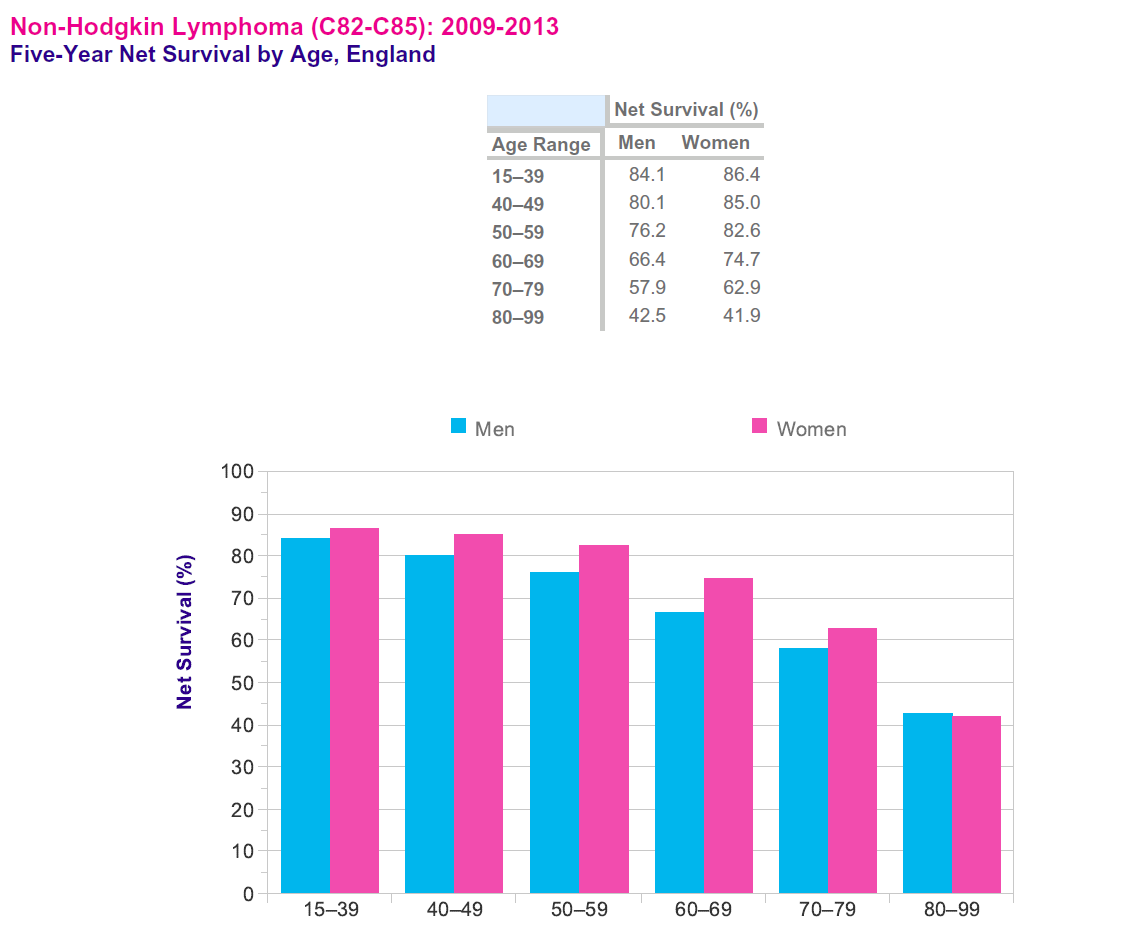Prognosis of non Hodgkin's lymphoma
Prognosis:
- almost two-thirds (63%) of people diagnosed with Non-Hodgkin lymphoma in England and Wales survive their disease for ten years or more (2010-11)
- around 7 in 10 (69%) of people diagnosed with Non-Hodgkin lymphoma cancer in England and Wales survive their disease for five years or more (2010-11)
- 8 in 10 (80%) of people/men/women diagnosed with Non-Hodgkin lymphoma cancer in England and Wales survive their disease for one year or more (2010-11)
- non-Hodgkin lymphoma survival is similar in men than women
- non-Hodgkin lymphoma survival in England is highest for people diagnosed aged under 40 (2009-2013)
- almost 9 in 10 people in England diagnosed with Non-Hodgkin lymphoma aged 15-39 survive their disease for five years or more, compared with more than 4 in 10 people diagnosed aged 80 and over (2009-2013)

- non-Hodgkin lymphoma survival is improving and has tripled in the last 40 years in the UK. In the 1970s, more than a fifth of people diagnosed with Non-Hodgkin lymphoma cancer survived their disease beyond ten years, now it's almost two-thirds
- when diagnosed at its earliest stage, 7 in 10 people with Non-Hodgkin lymphoma will survive their disease for five years or more, compared with less than 6 in 10 of people when diagnosed at the latest stage
- low-grade lymphomas have indolent clinical behavior
- low grade non-Hodgkin's lymphomas usually have a follicular histology and constitute 30% of the total
- 90% of patients are over 50 years old
- symptoms are often non-specific and the disease is usually disseminated at presentation.
- associated with a comparatively prolonged survival (median survival is 6-10 y)
- little potential for curative treatment
- tendency to transform to high-grade lymphomas
- intermediate and high-grade NHL
- intermediate grade accounts for 65% of non-Hodgkin's lymphoma
- incidence is rapidly increasing. Intermediate grade lymphomas occur at all ages, with a median age of 65 years
- two-thirds arise in lymph nodes, the patient presenting with lymphadenopathy. Other sites include GI tract, skin and brain
- most common histological type is large cell B cell lymphoma. The tumours are rapidly fatal if not treated
- high-grade NHL
- a rare non-Hodgkin's lymphoma found primarily in children and young adults
- main types are: lymphoblastic lymphoma Burkitt's lymphoma
- tumour lysis syndrome is a frequent problem during the initiation of chemotherapy.
- a rare non-Hodgkin's lymphoma found primarily in children and young adults
- approximately 70% of all patients with intermediate- and high-grade NHL relapse or never respond to initial therapy
- recurrences are most often within the first 2 years after therapy completion
- if relapsed or resistant NHL then prognosis is very poor (< 5-10% are alive at 2 years with conventional salvage chemotherapy regimens)
- intermediate grade accounts for 65% of non-Hodgkin's lymphoma
- if congenital or acquired immunodeficiency then there is an increased risk of lymphoma - these patients respond poorly to therapy
- aggressive T- or NK-cell lymphomas, in general, have worse prognoses than those with B-cell lymphomas
- with the exception the Ki-1 anaplastic large T- or null-cell lymphomas
- low levels of vitamin D have been associated with a decrease in clinical end points (event-free survival and overall survival) in subsets of patients with aggressive B-cell lymphoma
Reference:
- (1) National Cancer Institute at the National Institutes of Health (NIH). Adult Non-Hodgkin Lymphoma Treatment
- (2) NICE (July 2016). Non-Hodgkin's lymphoma: diagnosis and management
- (3) CRUK. Non-Hodgkin lymphoma statistics (Accessed 28/5/2019).
- (4) Drake MT et al. Vitamin D insufficiency and prognosis in non-Hodgkin's lymphoma. J Clin Oncol. Sep 20 2010;28(27):4191-8
Create an account to add page annotations
Add information to this page that would be handy to have on hand during a consultation, such as a web address or phone number. This information will always be displayed when you visit this page